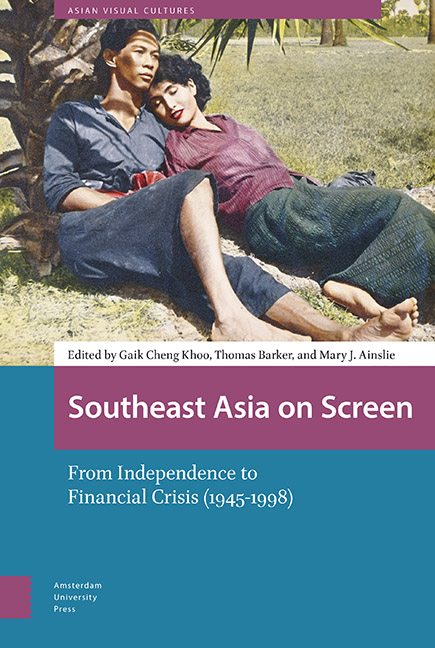Book contents
- Frontmatter
- Contents
- List of Illustrations
- Introduction: Southeast Asia on Screen: From Independence to Financial Crisis (1945–1998)
- Section 1 Independence and Post-World War II Filmmaking: Nation-building, Modernity and Golden Eras
- Section 2 Key Directors
- Section 3 Popular Pleasures
- About the Authors
- Index
1 - A Nation Imagined Differently: The Critical Impulse of 1950s Indonesian Cinema
Published online by Cambridge University Press: 20 November 2020
- Frontmatter
- Contents
- List of Illustrations
- Introduction: Southeast Asia on Screen: From Independence to Financial Crisis (1945–1998)
- Section 1 Independence and Post-World War II Filmmaking: Nation-building, Modernity and Golden Eras
- Section 2 Key Directors
- Section 3 Popular Pleasures
- About the Authors
- Index
Summary
Abstract
Re-examining longstanding scholarly assumptions about how media has shaped collective images of nationhood in Southeast Asia, this chapter argues that early Indonesian directors like Usmar Ismail, Nya Abbas Akup, and Asrul Sani adapted the modern medium of cinema not only to envision, but to continually trouble the viability of the Jakarta-centered ‘unity in diversity’ called for by President Soekarno in the 1950s. Closely reading Ismail's Tamu Agung (Honoured Guest, 1955) and Akup's Tiga Buronan (Three Fugitives, 1957), we focus on two apparent paradoxes in what came to be known as Indonesia's classical national cinema: filmmakers’ apprehensive view of nationalism; and their enthusiastic appropriation of local traditions and culturally-specific concepts – including ones considered ‘backward’ or provincial – despite the stated goal of modernizing national representation.
Keywords: Indonesian cinema, globalization, Soekarno era, nationalisms/ imagined communities
Coming on the heels of World War II and five additional years of armed struggle for independence against the Dutch (1945-1949), the period from 1950 to the early 1960s in Indonesia was both a heady time of celebration and one of continued upheaval during the initial process of postcolonial nation-building. Across Indonesia's roughly 17,000 islands, enthusiasm for modernization and the forging of a singular, forward-looking national identity were complicated, and often challenged by deeply embedded local modes of thought and expression. Divergent ideas of the nation and of its past and future abounded, and in Jakarta, Indonesia's capital, politicians and lawmakers had their work cut out for them; so too did self-identified nationalist filmmakers like Usmar Ismail, Asrul Sani and Nya Abbas Akup, many of whom had taken up arms in the fight to secure Indonesia's independence against the Dutch. Perhaps precisely due to the experience of violence, factionalism and moral confusion associated with those years, these artists, playwrights, essayists, doctors, lawyers and poets-turned-filmmakers subsequently rendered ‘Indonesia’ on screen in starkly realist strokes.
With strong links to cosmopolitan intellectual circles in West Sumatra, East Java, and elsewhere in the archipelago, Indonesia's emergent writerdirectors adapted the modern medium of cinema not only to envision, but to continually trouble and question the viability of the Jakarta-centred ‘unity in diversity’ called for by President Soekarno.
- Type
- Chapter
- Information
- Southeast Asia on ScreenFrom Independence to Financial Crisis (1945–1998), pp. 37 - 58Publisher: Amsterdam University PressPrint publication year: 2020



